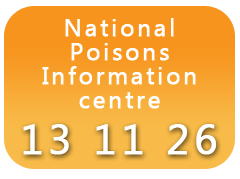
Poisoning can occur when a person ingests, inhales or has skin contact with household, agricultural and industrial chemicals or gas. Not only are farmers and agricultural workers at risk but also children or children visiting farms. Poisoning to stock, (sheep, cattle) and domestic pets, can also occur when exposed to waste such as broken vehicle batteries, chemical containers, snail and other vermin baits and general rubbish.
Reduce the risk of accidental poisoning by:
- Reading the instructions carefully on how to store, apply and the safety precautions required before using chemicals
- Keep and maintain an up to date written register of chemical and hazardous substances on the farm
- Wear appropriate Australian Standard levels of personal protective equipment when using chemicals and make sure areas are well ventilated
- Lock all chemicals and used chemical containers in appropriate storage facilities and out of reach of children, stock and pets
- Dispose of waste such as vehicle/truck batteries, or sump oils at appropriate refuse and recycling stations
- Dispose of agricultural containers through Drum muster centres
- Used chemical or expired chemicals can go through Chem Clear or phone 1800 008 182
- Also remember to keep medications in a safe place away from children
If you think someone has been poisoned, or has an unexplained illness, do not wait for further symptoms to develop.
Ring the National Poisons Information Centre on 13 11 26 immediately.
This is a 24 hour, 7 days a week service.
Do not try to make the person vomit, unless instructed to do so it may cause more injuries. Always call triple zero (000) in an emergency and have your address and location ready.
Fast facts:
- Farm chemicals, vehicle battery contents, solvents, cleaner, fumes and sprays can cause accidental poisoning.
- Poisoning may occur if chemicals are spilled on the skin, sprays are inhaled or splashed in the eyes or accidentally swallowed.
- If there’s a chance poisoning has occurred call the National Poison Information Hotline on 13 11 26
- If possible have name (and material data sheet) of the chemical the person has been exposed to.
References used for this topic
More information:
Department of Agriculture and Food (WA)
Preventing lead poisoning in farm animals
Department of Agriculture (Vic)
Working with chemicals
Department of Primary Industries (NSW)
Lead poisoning to livestock
National Poisons Information Centre
Call 13 11 26 – 24 hours a day, 7 days a week
Research & reviews:
Australian Institute of Health and Welfare
Accidental Poisoning
|
|